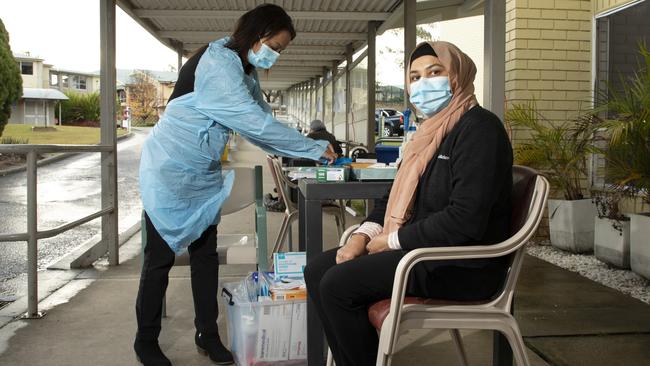Calls for rapid antigen testing in high risk settings
An aged care provider located in the epicentre of Sydney’s latest outbreak has introduced rapid antigen testing in a bid to bolster the facility’s defence against the virus.

An aged-care provider at the epicentre of Sydney’s latest outbreak has introduced rapid antigen testing in a bid to bolster the facility’s defence against the virus, as calls mount for the testing to be used more widely to protect people in high-risk settings.
Whiddon Aged Care at Glenfield in Sydney’s southwest is testing all residents and staff daily amid concerns about low vaccination rates among workers and the rampant spread of the highly infectious Delta strain in the community.
While more than 90 per cent of its residents are vaccinated, just 15 per cent of its staff are, making the threat of inadvertent transmission to the vulnerable a serious risk.
Rapid antigen tests are on-the-spot screening tests that detect antigens, or proteins, found on the surface of the virus and deliver a result in just 10 minutes.
While they are used widely in Britain and the US, where people can purchase tests in supermarkets, petrol stations and pharmacies, there has been little uptake in Australia.
The gold standard for testing domestically has been the saliva or nasopharyngeal PCR tests, which take up to 24 hours to return results. Resistance to a larger rollout of rapid antigen testing has often been down to questions about their effectiveness, with the tests approximately 95 per cent accurate for symptomatic cases and 50 to 60 per cent for asymptomatic cases.
Experts have been calling for the use of the rapid testing after leaks from state-managed hotel quarantine systems where PCR testing delays meant cases went undetected while people were infectious in the community, triggering outbreaks and lockdowns across the country.
Whiddon Aged Care chief Chris Mamarelis said the testing, which began on Tuesday, was about putting multiple layers in place to protect staff and residents, absent a faster vaccination rollout.
“When we started watching these hotspots emerge in southwest Sydney and the situation was escalating, we did some due diligence and decided this was another protective measure to increase our defences against Covid,” Mr Mamarelis said.
“We need measures like this while we are waiting for our community and our workforce to get to maximum vaccination levels.”
Mr Mamarelis said the frequency of the rapid-testing countered concerns about its effectiveness, and urged other aged-care facilities to consider a similar pilot program. The facility is collating the information and will share its results with the federal Department of Health and NSW Health, which have both expressed interest in the program.
Authorities have rebuffed calls to introduce rapid antigen testing.



To join the conversation, please log in. Don't have an account? Register
Join the conversation, you are commenting as Logout